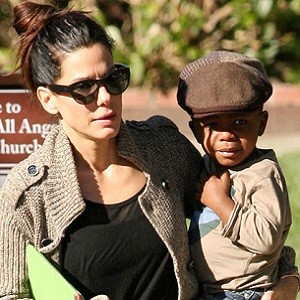Sandra Bullock on Being a Single Parent
 Celebrity single parent Sandra Bullock says, Louis is the No. 1 man in her life! Sandra Bullock revealed in a recent interview that she’s quite content being a single mom to son Louis, 3 — but she’s open to playing the field
Celebrity single parent Sandra Bullock says, Louis is the No. 1 man in her life! Sandra Bullock revealed in a recent interview that she’s quite content being a single mom to son Louis, 3 — but she’s open to playing the field
“If [a relationship] should come along, great. But I feel like I’m not missing anything yet,” she told Entertainment Weekly of being single. “Maybe one day I will. But my son is 3 years old, which is an amazing age. Four is an even better age. So if something happens, great, but if not, I’ve got plenty to do.”
The Oscar winner previously went through a very public breakup in March 2010 when it was revealed that her husband of five years, motorcycle customizer Jesse James, cheated on her with multiple women. Just two months earlier, Bullock brought home her adopted baby boy.
Now, three years after the bombshell, Bullock is making headlines again with her Oscar-buzzed film Gravity, and the several hilarious antics that surfaced while she and costar George Clooney promoted it. In November, the 52-year-old silver fox joked that Bullock tends to drunk dial him at night.
“Yeah, I heard, I heard. You know what? I’m so embarrassed for him because I think he’s showing his vulnerable side,” Bullock joked back to EW. “It’s a booty call. But then he wants the commitment and the marriage and I’m like,’Dude, I don’t have the time.’ And he’s all, ‘But I’m not a one night stand kind of guy.’ Well, then, I can’t.'”
She quipped: “Drunk dialing is what it is, George. I just need an hour of your time.”


